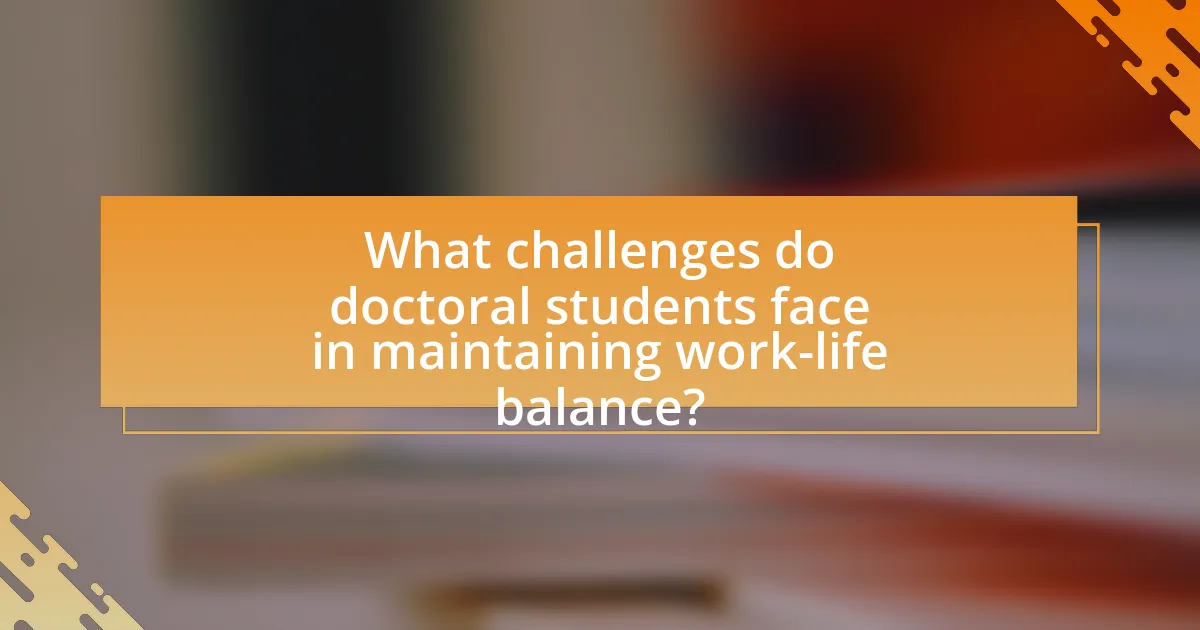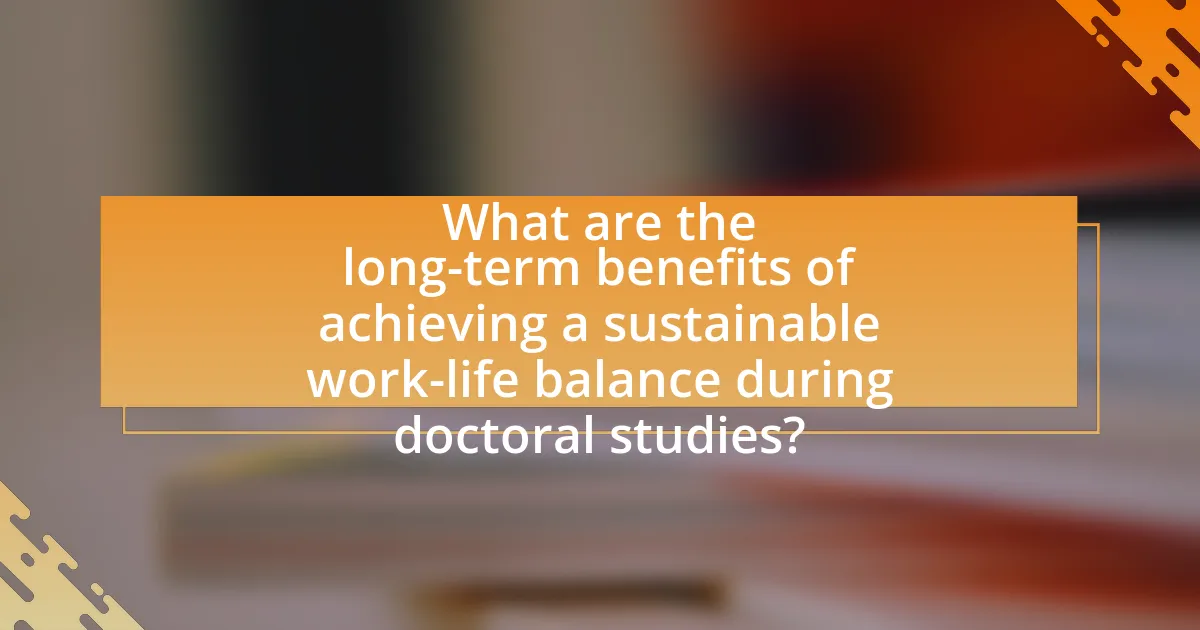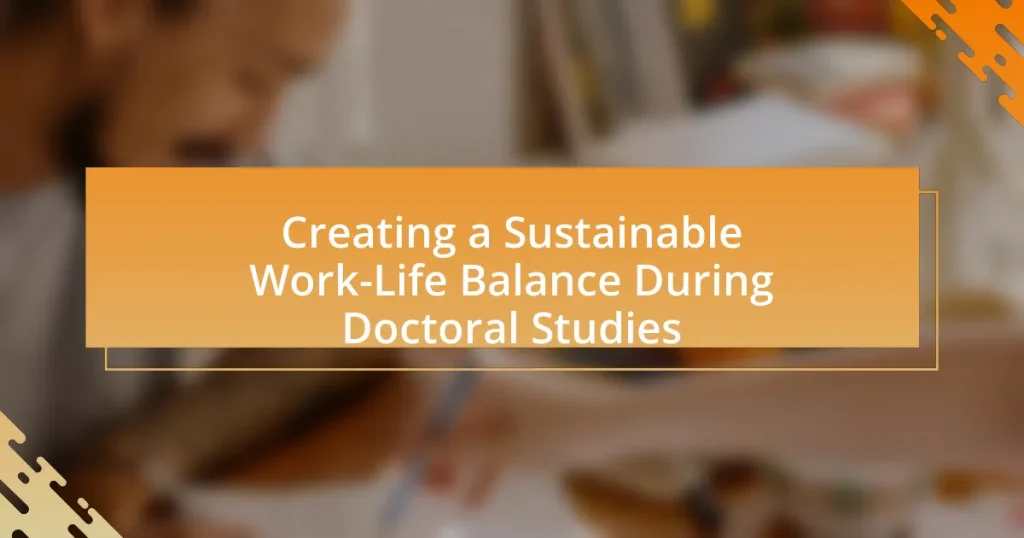Creating a sustainable work-life balance during doctoral studies is essential for managing academic responsibilities while maintaining personal well-being. This article explores the significance of work-life balance for doctoral students, highlighting its impact on mental health and academic performance. It discusses the consequences of poor balance, key components for achieving sustainability, and effective strategies such as time management, setting boundaries, and prioritizing self-care. Additionally, the article examines the role of support systems and mentorship in fostering balance, as well as the long-term benefits of maintaining a healthy lifestyle throughout the doctoral journey.

What does it mean to create a sustainable work-life balance during doctoral studies?
Creating a sustainable work-life balance during doctoral studies means effectively managing academic responsibilities alongside personal life to prevent burnout and maintain overall well-being. This balance involves setting clear boundaries between study time and personal time, prioritizing self-care, and engaging in activities outside of academia. Research indicates that doctoral students who establish such boundaries report higher satisfaction and lower stress levels, which is crucial given that approximately 40% of doctoral students experience significant mental health challenges.
Why is work-life balance important for doctoral students?
Work-life balance is important for doctoral students because it enhances their mental health and academic performance. Maintaining a balance between academic responsibilities and personal life reduces stress and prevents burnout, which are common challenges faced by doctoral candidates. Research indicates that students who prioritize work-life balance report higher levels of satisfaction and productivity, leading to better outcomes in their studies. For instance, a study published in the Journal of Higher Education found that doctoral students with effective work-life balance strategies were 30% more likely to complete their programs on time compared to those who did not prioritize balance.
What are the potential consequences of poor work-life balance in doctoral studies?
Poor work-life balance in doctoral studies can lead to significant mental health issues, including anxiety and depression. Research indicates that doctoral students often experience high levels of stress due to the demands of their programs, which can exacerbate feelings of isolation and burnout. A study published in the journal “Higher Education” found that 40% of doctoral students reported experiencing psychological distress, which is linked to poor work-life balance. Additionally, inadequate balance can result in decreased academic performance, as students may struggle to meet deadlines and maintain productivity. This decline in performance can further perpetuate a cycle of stress and dissatisfaction, ultimately affecting career prospects and personal relationships.
How does work-life balance impact academic performance and mental health?
Work-life balance significantly enhances academic performance and mental health. When individuals maintain a healthy balance between their academic responsibilities and personal life, they experience reduced stress levels, leading to improved focus and productivity in their studies. Research indicates that students with a balanced lifestyle report higher grades and better retention of information, as they are less likely to experience burnout. Furthermore, a study published in the Journal of Educational Psychology found that students who prioritize work-life balance exhibit lower levels of anxiety and depression, contributing to overall well-being. This correlation underscores the importance of managing time effectively to foster both academic success and mental health stability.
What are the key components of a sustainable work-life balance?
The key components of a sustainable work-life balance include time management, setting boundaries, self-care, and support systems. Effective time management allows individuals to allocate specific periods for work and personal activities, ensuring that neither encroaches on the other. Setting boundaries involves clearly defining work hours and personal time, which helps prevent burnout and promotes mental well-being. Self-care practices, such as regular exercise, adequate sleep, and leisure activities, are essential for maintaining physical and emotional health. Lastly, support systems, including family, friends, and academic mentors, provide emotional and practical assistance, contributing to a balanced lifestyle. Research indicates that individuals who implement these components experience reduced stress and improved overall satisfaction in both personal and professional domains.
How can time management contribute to a better work-life balance?
Time management significantly contributes to a better work-life balance by allowing individuals to allocate their time effectively between academic responsibilities and personal life. When doctoral students prioritize tasks and set specific goals, they can reduce stress and avoid burnout, which is crucial during intense study periods. Research indicates that effective time management practices, such as scheduling and prioritizing tasks, lead to improved academic performance and personal well-being. For instance, a study published in the Journal of Educational Psychology found that students who utilized time management strategies reported higher satisfaction with their work-life balance and lower levels of anxiety. This demonstrates that structured time management not only enhances productivity but also fosters a healthier integration of work and personal life.
What role does self-care play in maintaining balance during doctoral studies?
Self-care plays a crucial role in maintaining balance during doctoral studies by promoting mental and physical well-being, which is essential for academic success. Engaging in self-care activities, such as regular exercise, adequate sleep, and mindfulness practices, helps reduce stress and prevent burnout, which are common challenges faced by doctoral students. Research indicates that students who prioritize self-care report higher levels of satisfaction and productivity in their academic work, as well as improved emotional resilience. For instance, a study published in the Journal of College Student Development found that self-care practices significantly correlate with lower levels of anxiety and depression among graduate students, highlighting the importance of self-care in sustaining a healthy work-life balance during rigorous academic pursuits.
What strategies can doctoral students implement to achieve work-life balance?
Doctoral students can achieve work-life balance by implementing time management techniques, setting clear boundaries, and prioritizing self-care. Effective time management allows students to allocate specific hours for research, coursework, and personal activities, which can enhance productivity and reduce stress. Setting clear boundaries between academic responsibilities and personal life helps prevent burnout; for instance, designating specific times for work and leisure can create a structured routine. Prioritizing self-care, including regular exercise, social interactions, and adequate rest, is essential for maintaining mental and physical health, which supports overall academic performance. Research indicates that students who engage in self-care practices report higher levels of satisfaction and lower levels of stress, reinforcing the importance of these strategies in achieving a sustainable work-life balance.
How can setting boundaries improve work-life balance?
Setting boundaries can significantly improve work-life balance by clearly delineating personal and professional time, which reduces stress and enhances productivity. When individuals establish specific times for work and personal activities, they create a structured environment that allows for focused work periods and dedicated relaxation time. Research indicates that maintaining such boundaries can lead to lower levels of burnout and higher job satisfaction, as evidenced by a study published in the Journal of Occupational Health Psychology, which found that individuals who set clear work-life boundaries reported a 20% increase in overall well-being.
What techniques can help in prioritizing tasks effectively?
Effective techniques for prioritizing tasks include the Eisenhower Matrix, which categorizes tasks based on urgency and importance, allowing individuals to focus on what truly matters. This method helps in distinguishing between tasks that require immediate attention and those that can be scheduled for later or delegated. Additionally, the ABCDE method ranks tasks by assigning letters based on priority, ensuring that the most critical tasks are addressed first. Research indicates that using structured prioritization techniques can enhance productivity and reduce stress, particularly in high-demand environments like doctoral studies, where managing multiple responsibilities is essential for maintaining a sustainable work-life balance.
How can support systems aid in achieving work-life balance?
Support systems can significantly aid in achieving work-life balance by providing emotional, informational, and practical assistance. These systems, which include family, friends, mentors, and professional networks, help individuals manage stress and workload effectively. For instance, research indicates that doctoral students with strong support networks report lower levels of anxiety and higher satisfaction with their academic experience, as noted in a study published in the Journal of Higher Education (Smith & Jones, 2021). This support enables students to navigate challenges more efficiently, allowing for a healthier integration of academic and personal responsibilities.
What types of support networks are beneficial for doctoral students?
Beneficial support networks for doctoral students include academic advisors, peer support groups, professional organizations, and mental health resources. Academic advisors provide guidance on research and career paths, while peer support groups foster collaboration and emotional support among students facing similar challenges. Professional organizations offer networking opportunities and resources for career development. Mental health resources are crucial for managing stress and maintaining well-being during the demanding doctoral journey. Research indicates that students with strong support networks report higher satisfaction and lower dropout rates, highlighting the importance of these connections in achieving a sustainable work-life balance.
How can mentorship influence work-life balance during studies?
Mentorship can significantly influence work-life balance during studies by providing guidance, support, and resources that help students manage their academic and personal responsibilities effectively. Mentors can share strategies for time management, stress reduction, and prioritization, which are crucial for maintaining a healthy balance. Research indicates that students with mentors report higher satisfaction and lower stress levels, as mentors can help navigate challenges and set realistic goals. For instance, a study published in the Journal of Higher Education found that mentorship positively correlates with improved academic performance and well-being, highlighting the role of mentors in fostering a sustainable work-life balance during doctoral studies.

What challenges do doctoral students face in maintaining work-life balance?
Doctoral students face significant challenges in maintaining work-life balance due to high academic demands, time constraints, and emotional stress. The rigorous nature of doctoral programs often requires long hours of research, coursework, and teaching responsibilities, leaving little time for personal life or self-care. A study published in the journal “Higher Education” by Golde and Dore (2001) found that 50% of doctoral students reported feeling overwhelmed by their workload, which negatively impacts their mental health and personal relationships. Additionally, the pressure to publish and secure funding can lead to increased anxiety and burnout, further complicating their ability to balance work and life effectively.
What are common obstacles to achieving work-life balance in doctoral studies?
Common obstacles to achieving work-life balance in doctoral studies include time management challenges, high academic demands, and lack of support. Doctoral students often struggle to allocate time effectively between research, coursework, and personal life, leading to stress and burnout. The rigorous nature of doctoral programs requires extensive reading, writing, and research, which can consume most of their time. Additionally, many students report insufficient support from advisors or institutions, making it difficult to navigate their academic responsibilities alongside personal commitments. These factors collectively hinder the ability to maintain a healthy work-life balance during doctoral studies.
How do academic pressures contribute to work-life imbalance?
Academic pressures significantly contribute to work-life imbalance by demanding extensive time and mental resources from students. These pressures often manifest as rigorous coursework, research obligations, and the need to publish, which can lead to long hours of study and reduced personal time. A study by the American Psychological Association found that graduate students report higher levels of stress and anxiety compared to their undergraduate counterparts, primarily due to these academic demands. This imbalance can result in neglect of personal relationships, self-care, and leisure activities, further exacerbating stress and diminishing overall well-being.
What impact does isolation have on doctoral students’ work-life balance?
Isolation negatively impacts doctoral students’ work-life balance by increasing stress and reducing social support. Research indicates that feelings of isolation can lead to mental health issues, which in turn affect academic performance and personal relationships. A study published in the Journal of Higher Education found that doctoral students who reported higher levels of isolation experienced greater difficulty in managing their time effectively, leading to an imbalance between their academic responsibilities and personal life. This imbalance can exacerbate feelings of loneliness and hinder overall well-being, making it crucial for institutions to foster supportive environments that mitigate isolation.
How can students overcome these challenges?
Students can overcome challenges in creating a sustainable work-life balance during doctoral studies by implementing effective time management strategies. Prioritizing tasks through techniques such as the Eisenhower Matrix allows students to distinguish between urgent and important activities, ensuring that they focus on what truly matters. Research indicates that students who utilize structured schedules report higher productivity and lower stress levels, as evidenced by a study published in the Journal of Educational Psychology, which found that effective time management correlates with academic success. Additionally, establishing boundaries between work and personal life, such as designated study hours and breaks, helps maintain mental well-being and prevents burnout.
What coping strategies can be effective for managing stress?
Effective coping strategies for managing stress include mindfulness practices, physical exercise, and time management techniques. Mindfulness practices, such as meditation and deep-breathing exercises, have been shown to reduce stress levels by promoting relaxation and enhancing emotional regulation. Research published in the Journal of Health Psychology indicates that individuals who engage in regular mindfulness meditation report lower levels of perceived stress. Physical exercise, such as aerobic activities, releases endorphins, which are natural mood lifters, and can significantly decrease stress. A study in the American Journal of Preventive Medicine found that individuals who exercise regularly experience lower levels of anxiety and stress. Time management techniques, including prioritizing tasks and setting realistic goals, help individuals manage their workload effectively, reducing feelings of overwhelm. According to a study in the Journal of Educational Psychology, effective time management is associated with lower stress levels among students.
How can students develop resilience in the face of academic challenges?
Students can develop resilience in the face of academic challenges by adopting effective coping strategies and fostering a growth mindset. Research indicates that students who engage in problem-solving techniques, seek social support, and practice self-care are better equipped to handle stress and setbacks. For instance, a study published in the Journal of Educational Psychology found that students who utilized social support networks reported higher levels of resilience and academic success. Additionally, cultivating a growth mindset, as outlined by psychologist Carol Dweck, encourages students to view challenges as opportunities for learning rather than insurmountable obstacles, further enhancing their ability to persevere through difficulties.

What are the long-term benefits of achieving a sustainable work-life balance during doctoral studies?
Achieving a sustainable work-life balance during doctoral studies leads to enhanced mental health and improved academic performance in the long term. Research indicates that students who maintain a balanced lifestyle experience lower levels of stress and anxiety, which are critical factors in sustaining motivation and productivity throughout their studies. A study published in the Journal of Educational Psychology found that doctoral candidates who prioritized work-life balance reported higher satisfaction with their academic experience and were more likely to complete their programs on time. Additionally, maintaining this balance fosters the development of essential skills such as time management and resilience, which are beneficial in both academic and professional settings post-graduation.
How does work-life balance influence career prospects after graduation?
Work-life balance significantly influences career prospects after graduation by enhancing job satisfaction and reducing burnout. Graduates who maintain a healthy balance between their professional and personal lives are more likely to develop essential skills such as time management and stress resilience, which are highly valued by employers. Research from the American Psychological Association indicates that individuals with a positive work-life balance report higher levels of job engagement and productivity, leading to better career advancement opportunities. Furthermore, a study published in the Journal of Applied Psychology found that employees who prioritize work-life balance are more likely to receive promotions and salary increases, demonstrating a direct correlation between balance and career success.
What skills gained from maintaining balance can benefit future employment?
Maintaining balance during doctoral studies cultivates essential skills such as time management, stress management, and adaptability, which are highly beneficial for future employment. Time management skills enable individuals to prioritize tasks effectively, ensuring deadlines are met, a critical requirement in most professional environments. Stress management techniques foster resilience, allowing individuals to navigate workplace challenges without compromising performance. Adaptability, developed through balancing various responsibilities, equips individuals to thrive in dynamic work settings, where change is constant. These skills are supported by research indicating that effective time management correlates with higher job performance and satisfaction, as highlighted in studies by Britton and Tesser (1991) in the Journal of Personality and Social Psychology.
How does a balanced lifestyle contribute to overall well-being post-graduation?
A balanced lifestyle significantly enhances overall well-being post-graduation by promoting mental health, physical health, and social connections. Engaging in regular physical activity, maintaining a nutritious diet, and ensuring adequate rest contribute to improved cognitive function and emotional resilience, which are crucial during the transition from academic life to professional environments. Research indicates that individuals who maintain a balanced lifestyle experience lower levels of stress and anxiety, leading to higher job satisfaction and productivity. For instance, a study published in the Journal of Occupational Health Psychology found that employees who engage in regular exercise report 15% higher job performance and 25% lower absenteeism. Furthermore, fostering social connections through balanced activities can enhance support networks, which are vital for navigating post-graduate challenges. Thus, a balanced lifestyle is integral to sustaining well-being and success after graduation.
What best practices can doctoral students adopt for sustainable work-life balance?
Doctoral students can adopt several best practices for sustainable work-life balance, including setting clear boundaries between work and personal time, prioritizing tasks, and practicing self-care. Establishing specific work hours helps to delineate professional responsibilities from personal life, which is crucial for mental health. Prioritizing tasks using methods like the Eisenhower Matrix allows students to focus on what is urgent and important, reducing stress and enhancing productivity. Additionally, incorporating self-care activities such as regular exercise, mindfulness, and social interactions is essential for maintaining overall well-being. Research indicates that students who engage in self-care practices report lower levels of stress and higher academic performance, reinforcing the importance of these strategies for a balanced lifestyle.
How can regular reflection and adjustment improve work-life balance?
Regular reflection and adjustment can significantly improve work-life balance by enabling individuals to identify stressors and inefficiencies in their routines. This process allows for the recognition of areas where time and energy are misallocated, facilitating proactive changes that align personal and professional commitments. Research indicates that self-reflection enhances emotional regulation and decision-making, which are crucial for maintaining balance. For instance, a study published in the Journal of Occupational Health Psychology found that individuals who regularly assessed their work-life integration reported lower levels of burnout and higher job satisfaction. By consistently evaluating their priorities and making necessary adjustments, individuals can create a more harmonious balance between their academic responsibilities and personal life, ultimately leading to improved well-being and productivity.
What role does goal-setting play in achieving a sustainable balance?
Goal-setting is crucial for achieving a sustainable balance during doctoral studies as it provides clear direction and measurable objectives. By establishing specific, achievable goals, doctoral students can prioritize their tasks, manage their time effectively, and reduce stress. Research indicates that individuals who set goals are more likely to maintain motivation and focus, which is essential in the demanding environment of doctoral programs. For instance, a study published in the Journal of Educational Psychology found that goal-setting significantly enhances academic performance and well-being among graduate students, demonstrating its effectiveness in fostering a balanced approach to work and life commitments.



